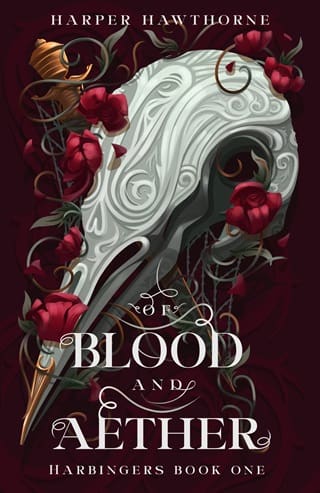15. Chapter Fifteen
I was developing a newfound appreciation for the subject of Arcane History.
After over a month in Sophrosyne, it came as no surprise to me that my preference of study had been in the more practical subjects thus far—I was a tactile learner, and making legitimate use of my Resonances was significantly more engaging.
Even though I had only learned the very basics of arcana so far, everything that I was learning to do with Light, I was able to replicate with the other elements—my hidden Resonances—in the privacy of Amaretta’s studio. It had been exhilarating to see what I could do with just a little bit of guidance and technique.
Though I had always enjoyed reading historical texts back home, now that I had a taste for arcana, I was finding most of my courses on things such as history, Bios, and anthropology to be a bit dry in comparison. But today, I was enraptured, utterly engrossed as High Scholar Sykes spoke on a subject that I had been wholly unaware of for my entire life: the history of the Cataclysm.
Before the scholar had began our lecture, she explained that what we were about to learn qualified as knowledge exclusive to the Studium—and sure enough, when I glanced down at my wrist, I could see the silver tattoo begin to glow with that strange Aetherborne arcana, a spell with complexity beyond my novice understanding.
“Today, young Conduits, you will learn about a great sacrifice,” Scholar Sykes began. “And a truth that is not kept concealed for the sake of posterity or control, but rather the overall safety of Aemos and her people. You will most certainly have questions, but I ask that you hold on to them for the latter half of the session, when we break out into discussion groups.”
Over the course of the next hour, High Scholar Sykes wove a tale so intricate and beautiful that it almost felt as though it was a sort of faerie-tale, not a true recounting of history as we knew it.
According to the mythos of the creation of mankind, the Elders loved us deeply, and by default—because we were their children, after all. But beyond the fact that our species had been born mortal after some strange circumstance of evolution, we were also different from the Aetherborne—and they loved us for that, too.
Our lives were shorter, and thus we were more ephemeral creatures by nature. In time, the Elders discovered that the first humans were far more emotional, passionate, and creative than their progenitors—within their shortened lifespans, they innovated, they explored, they created art and music and laughed and screamed and cried and loved, all so viscerally.
In their own immortality, the Aetherborne had grown stagnant as a species, having a tendency to crystallize over the eons. It made sense, when you thought about it. With enough time to experience anything and everything this plane of existence had to offer, one might begin to lose that inherent curiosity and thirst for more. Such was so with the Aetherborne, where even the most exhilarating emotions and experiences had grown blunted, dulled over time.
And then we mortals came along, all loud and bumbling and breakable—and we reminded them of a youth long forgotten. As an inadvertent consequence of our birth, we’d restored humanity to the realm of Aemos, and thus we were named: Humans.
In those earlier days where Aetherborne and mankind were more equal in number, they had collectively decided to watch over us. They were our protectors as the human species began to grow and develop, because they thought we were worth protecting. They did not find our mortality to be a flaw, but rather quite the opposite. Aemos had always been considered the Plane of Life, and to them, we were symbols of that more fleeting, cyclical vitality.
It was that desire to protect us that led to the formation of the Convocation.
Several hundred years after the birth of humankind, the Cataclysm took place. There was a great, unnatural upheaval of aether that occurred as a result of a lack of balance. For everything that humans offered that was beautiful and good, we were also deeply flawed. As our population exploded, so did the growth of senseless war, violence and death. The plane struggled to preserve itself in our wake, and the Cataclysm began—leaving Aemos on the brink of ruin.
The aetherstorms that occurred as a result of this expedited cycle of life and death caused chasms to form between the very planes of existence. Rifts tore from the void space in between realms—from the Abyss—and summoned forth beasts and plague and chaos that even the gods did not know how to handle.
When all seemed lost, and the threat of extinction of both species seemed inevitable, it was said that the Source herself intervened. The Aetherborne experienced a moment in time referred to as “The Awakening”—an otherworldly connection of every living mind and soul of the immortals, which allowed them to collectively decide how to save us all.
Together, the gods determined that in order to close the chasms and restore balance to the plane, a majority of the Aetherborne’s arcane power would need to be condensed and shifted into the hands of a select few. Somehow, the majority of the surviving Aetherborne conceived a method to give up most of their aether, and thus their immortalities, just so that they could amplify the strength of those who had been selected to deliver our realm to safety.
The methods used were understandably kept secret and even though this information was guarded by our arcane brands, the scholar did not go into detail about how it had been done. Perhaps even she did not know. Either way, that transfer of aether dramatically increased the power of its recipients, allowing nineteen souls to quell the calamities that were threatening to end all life on Aemos. They were able to mend the tears between worlds with pure aether, temporarily wielding the true powers of Creation as if they were extensions of the Source itself.
Those nineteen Aetherborne were the very same who served on the Convocation to this day. The Elders that I stood before on the day of my trial were the very ones who saved the world, built the Studium, and led mankind into an era of innovation and safety.
I could understand, now, how religion must have developed over time, though I was a secularist myself. It made sense that some still worshiped the Aetherborne as gods, imagining them to be omnipotent, exalted beings. It was hard not to be awestruck—emotional, even—over just how much our forefathers had sacrificed just to ensure our survival. And perhaps the immortals could have survived the Cataclysm, but the humans most certainly would not have.
It was easier, now, to understand the intent and the inherent selflessness behind the Arcane Studium. To understand why the Nineteen would still be so willing to teach us, to offer such free and fair access to their knowledge.
After all they had given us, after all they had lost—the Aetherborne didn’t want humankind to simply survive.
They wanted us to thrive.
The discussions with my peer group after the lecture were less than satisfactory.
A majority of the other Conduits seemed appreciative of this new revelation, at least slightly grateful for it—but very few of them appeared to be as moved by the gravity of it all. A few were even skeptical, suggesting that High Scholar Sykes spoke with a little too much reverence on the subject, biased in favor of the Aetherborne.
I knew that history was biased—always written by the victors—but if the Aetherborne wanted to be worshiped or admired for what they had done, why would they keep the knowledge of what happened restricted to attendees of the Studium?
I had never fully understood why many humans seemed to have this slight, lingering resentment towards the Elders. Was it envy? Or misunderstanding?
I also continued to ponder over the philosophy behind it all, questioning whether or not we as a species had given enough back to the Elders or to Aemos as a whole. A majority of us had no idea what our lives, our futures, our potential—what it had all cost our living predecessors.
Would that change anything, if it were common knowledge? Would we live differently, if we understood how fragile existence truly was?
I was so lost in thought as I made my way through the halls that I didn’t notice that someone had stopped right in front of me until it was too late—I ran straight into them, dropping my texts and notebook in the process.
Well, that was embarrassing, I thought to myself before I opened my mouth to apologize to whoever I’d just run over.
Once I saw who it was, however, the apology dissolved on my tongue.
Seriously? Again? What was he even doing in this quarter?
“Thousands upon thousands of souls in this city, and yet here I am running into you again, Captain. Did you stop in front of me on purpose?” I scowled at him in accusation, bending over to pick up my books.
“I may have, yeah,” he laughed. “In my defense, I was surprised to see you, and sort of expected you would look up eventually before knocking straight into someone.”
“Surprised to see me? A student, leaving a lecture hall? I’d argue I’m more surprised to see you here. Are you sure you’re not following me?”
“The guard meets once a week in the amphitheater for general briefings. I can assure you I didn’t come all this way just to harass the best and brightest minds of Sophrosyne,” he said with a smirk.
“Just me, then?”
“You seem pretty bright to me, Little Conduit. A little uncoordinated, maybe, but rather clever.”
Not clever enough to avoid running into this gods-forsaken man, apparently.
I didn’t have anything against Kieran, but I also couldn’t stop thinking about him. And these random encounters absolutely weren’t helping the matter. Especially not when he kept complimenting me like that. His attention stroked my ego to no apparent end, and that was… dangerous.
I sighed.
“Long lecture?” he asked.
“No. Well, yes. It was lengthy, but it was interesting. It was just intense… I hadn’t realized how many details from our histories were kept exclusive to the Studium,” I explained.
“Ah, yeah. The Cataclysm, I presume?”
I nodded.
“Heavy shit,” Kieran agreed. “Though if it helps, that’s probably the most jarring revelation you’re going to face here. Probably.”
“That’s a relief,” I said. “I think I can only handle one apocalyptic shift in my understanding of reality per academic quarter.”
He chuckled.
“That’s fair. Are you headed off to another lecture?” Kieran asked.
“No, I’m done for the day. Why?” I asked, curious where he was going with this.
“Wanna grab lunch?”
Oh.
Well, that was unexpected. And it seemed as though the ever-meddling Fates were making it damn near impossible for me to avoid this man, so…
“Sure, why not?”
I had nothing else better to do.
 Fullepub
Fullepub 



